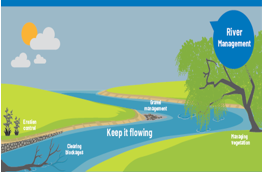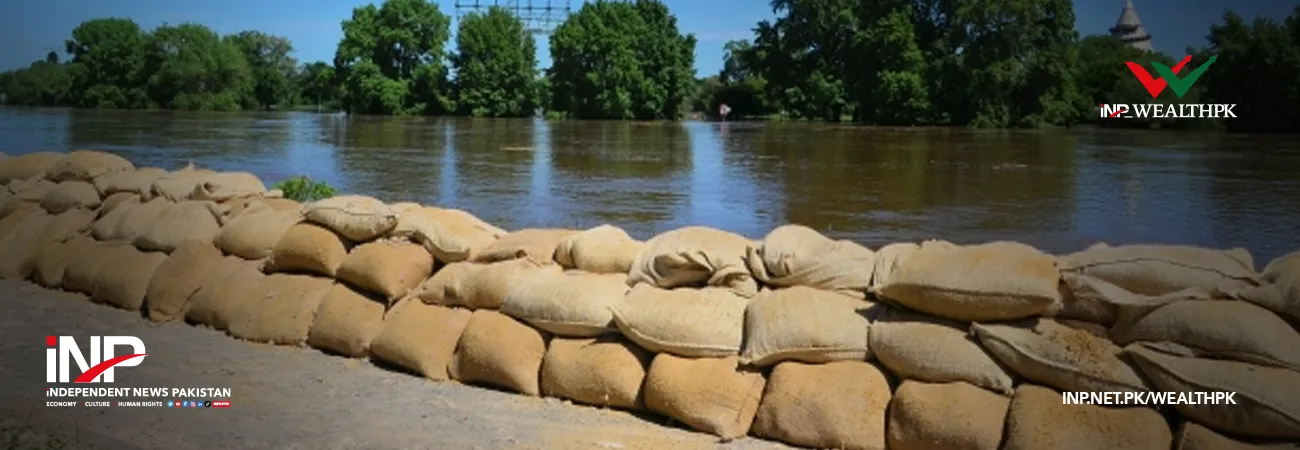INP-WealthPk
Azeem Ahmed Khan
An environmental expert has called for a major shift in Pakistan’s flood management strategy, urging authorities to move away from costly mega projects and adopt low-cost, nature-based solutions to better cope with worsening climate disasters.
“I have proposed a framework called the ‘Flood Welcome Policy’ with the purpose to divert our attention away from big structural projects,” said Dr Muhammad Faisal Ali, Research Fellow at Pakistan Institute of Development Economics, told Wealth Pakistan, who holds PhD in Environmental and Resource Economics.
He explained that large dams, barrages, and canal systems cannot provide complete protection during extreme flood events. “They require huge capital, take years to complete, and still fail to secure us in extraordinary situations,” Dr Faisal told Wealth Pakistan.

On the contrary, the Flood Welcome Policy promotes urgent, closer-to-nature measures such as restoring river paths, reviving wetlands, forestation, and watershed management in upper catchment areas to reduce water intensity, he explained. It also encourages rainwater harvesting, urban water-sinking parks, and adopting China’s ‘Sponge City’ model in Pakistan’s major cities, Dr Faisal said.
“These actions are not only low-cost but also restore biodiversity, create local jobs, and improve climate resilience,” he said, emphasizing that the success of such plans depends on timely availability of funds.
The Flood Welcome Policy is a vision to turn floods from disasters into opportunities, he said. “If implemented properly, it can transform Pakistan’s biggest environmental challenge into a source of resilience, productivity, and sustainability, but if we fail to act now, we will face the same devastation again next year.”
Dr Faisal said: “Millions spent on this effort may save billions in the future, but we must begin with research, planning, and collective resolve.” “This year Pakistan once again faced severe floods,” Dr Faisal said, noting that “2025 is a unique year in Pakistan’s history, as it has faced almost all kinds of floods.”
He added that major rivers -- Ravi, Sutlej, Chenab and Indus -- were all hit by high-level floods, while flash floods struck Buner in Khyber Pakhtunkhwa, glacial lake outburst floods hit Ghizer in Gilgit-Baltistan, and cloudbursts triggered urban flooding in Chakwal, Karachi, Rawalpindi, Sialkot and Islamabad.
“These floods caused massive destruction, hundreds of thousands of people lost their homes, infrastructure was damaged, and crops and vegetables were washed away,” he said, warning that the situation has raised serious food security concerns. “Every citizen of Pakistan is affected by floods, directly or indirectly, especially those from the lower and middle classes,” he added.
Faisal linked the rising frequency and intensity of floods to climate change and abnormal monsoon behaviour, noting that the mega floods of 2010, 2022, and 2025 are clear examples. “From 1980 to 2004, Pakistan faced about 30 major flood events, while between 2014 and 2024, the number increased to over 44. Disasters are increasing both in number and severity,” he warned.
Pakistan’s devastating monsoon season has claimed 1,037 lives and left 1,067 people injured between June 26 and October 1 this year, according to the National Disaster Management Authority (NDMA). The authority reported that 229,763 houses were damaged and 22,841 livestock lost to the floods that swept through large parts of the country. Infrastructure has also suffered extensive destruction, with 2,811 kilometres of roads and 790 bridges damaged nationwide.
The NDMA said that 3.03 million people were evacuated from affected areas as floodwaters rose. To assist victims, authorities have established 1,690 relief and medical camps across the country, providing shelter to 152,252 displaced people. So far, 662,098 flood-hit people have received medical treatment at these camps.
Credit: INP-WealthPk









